BU Ignition Awards to Accelerate Products for Repairing Damaged Teeth, Fighting Cancer, Boosting Reading Skills, and More
BU Technology Development’s 2023 Ignition Awards help researchers transform their ideas into life-changing products and services

Photo by Adele Bertschy
BU Ignition Awards to Accelerate Products for Repairing Damaged Teeth, Fighting Cancer, Boosting Reading Skills, and More
BU Technology Development’s 2023 Ignition Awards help researchers transform their ideas into life-changing products and services
In labs across Boston University, researchers are working on ideas and technologies that could change—and save—lives. Like an enamel-mimicking formula that can repair damaged teeth, an AI-based tool that improves elementary students’ reading skills, and a process for supercharging cancer-fighting immune cells. But sometimes these innovations need a little help making the jump from promising research project to transformative product for our homes, hospitals, schools, and beyond. That’s where the BU Ignition Awards come in.
Given by BU Technology Development, the awards are designed to accelerate the advancement of promising new science and technology. Among the 2023 winners are the tooth-saving formula, AI-powered reading tool, and cancer-fighting technology.
In addition to a financial grant, award winners receive coaching and support to bring their innovations to market, helping them more easily make the move from academic research to a tangible proof-of-concept required for a company to invest. If successful, the 2023 cohort of scientists and engineers may become Boston’s newest entrepreneurs.
The 2023 Ignition Awards have been given to eight projects, each recognized for its commercial potential. Previous winners have gone on to launch companies offering a stem-cell treatment for cancer, an efficient water-free system for cleaning solar panels, and a therapy for reversing organ failure.
The Brink took a closer look at the newest winners.
Restoring Tooth Enamel
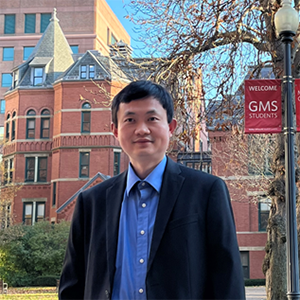
Once an adult’s teeth are damaged—be it from bacteria, trauma, or normal wear and corrosion—the durable enamel that covers them doesn’t grow back. With current techniques and technologies, dentists can save some teeth, but not all. The treatment methods are invasive, and some patients are afraid of the drilling involved. Many restorations will fail because the dental materials are neither structured like enamel nor integrated into the tooth structure.
Yuwei Fan, a BU Henry M. Goldman School of Dental Medicine research associate professor of restorative sciences and biomaterials, may have a permanent solution: he’s developed a new process that could restore enamel directly on the surface of a tooth, replacing any loss. The technique relies on a special formula that deposits enamel-structured materials onto the damaged tooth surface. Fan, who’s also a research operations director, has already tested the process in the lab in conditions that simulate the human mouth environment, and will use the Ignition Award to move the technology closer to clinical trials.
Helping Stroke Victims Walk Again
Each year, nearly 800,000 Americans suffer a stroke that hinders their ability to speak, walk, see, or move certain muscles. Although immediate care can help people survive their initial medical emergency, they are often left with lifelong disability, and require assistive devices like wheelchairs to get around.
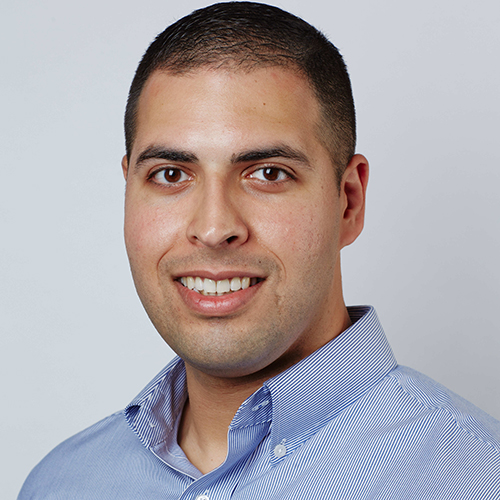
Lou Awad, a College of Health & Rehabilitation Sciences: Sargent College associate professor of physical therapy, and his lab have developed a new AI-driven therapeutic device that could help people restore their walk after a stroke. This wearable device, called reNeu, can stimulate and contract calf muscles, which help lift and lower a patient’s foot, generating nerve activity that strengthens the parts of the brain responsible for those movements. reNeu, which is small enough to fit on the calf, is highly adaptable: as a patient walks across different ground surfaces, advanced gait algorithms detect the leg’s motion and adjust the timing of the electrical impulses accordingly. This important advancement will help patients relearn how to walk in real-world conditions, where ground surfaces change constantly and each step is different from the last.
Treating Kidney and Eye Disease
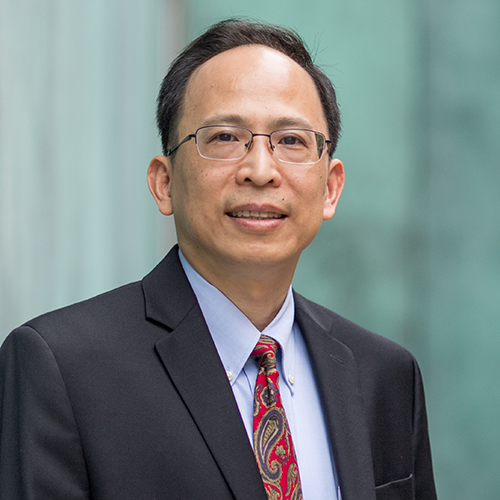
As organs go, kidneys and eyes don’t seem to have much in common. One filters waste from our blood; the other lets us see the world around us. Weining Lu, however, has discovered that they share a common genetic signaling pathway called ROBO—and blocking that pathway could treat disease in both organs. Many kidney and retina disorders are caused by the growth of abnormal blood vessels that can leak, swell, and form scar tissue, he says. Manipulating ROBO may slow or stop those vessels from growing, halting the progression of disease. Lu is a Chobanian & Avedisian School of Medicine associate professor of medicine, pathology, and laboratory medicine.
He is currently developing preclinical tests in the lab to gauge how well ROBO-inhibiting drugs work to treat eye diseases like age-related macular degeneration and diabetic retinopathy.
Fighting Cancer with Supercharged T Cells
Many cancer therapies today recruit the body’s own immune system to fight tumors. One such exciting immunotherapy involves removing T cells (a type of white blood cell) from a patient’s body, genetically reprogramming them to seek and destroy cancerous cells, and then injecting them back into the body to carry out their orders. But each round of these treatments is only active for a short amount of time before losing steam.
Mark Grinstaff and Wilson Wong are developing a new way to coax these modified immune cells, called CAR T cells, into attacking their targets for longer periods and with greater levels of intensity. By introducing a specialized RNA molecule into T cells, the researchers force the cells to express more cancer-targeting proteins on their surface, making them more likely to find and destroy tumors. If successful, this technology will make existing immunotherapies far more effective. Grinstaff is the University’s inaugural Distinguished Professor of Translational Research and Wong is a BU College of Engineering associate professor of biomedical engineering.
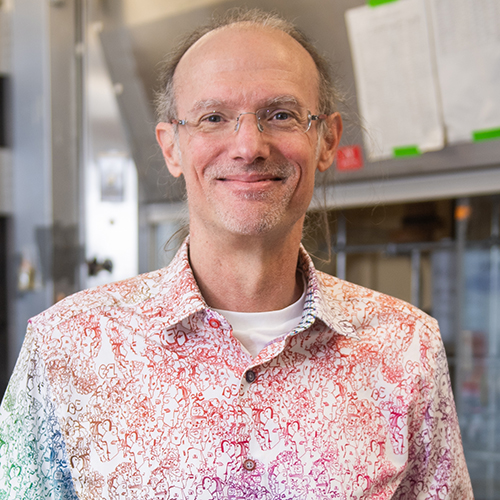
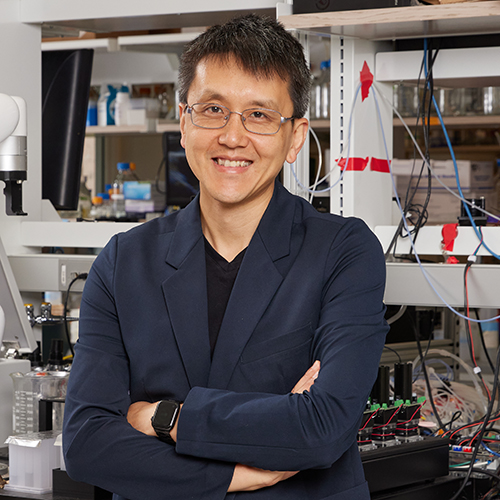
Mimicking the Human Lung
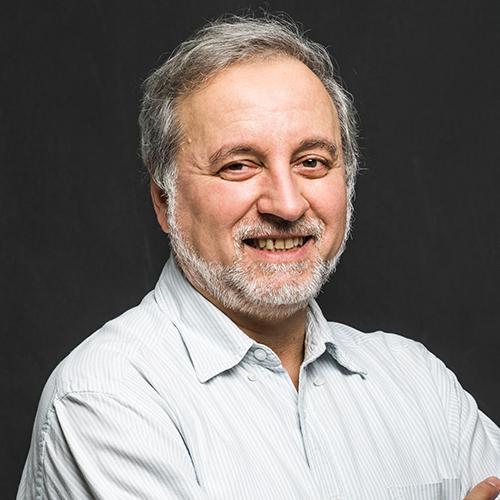
At the moment, there’s no cure for major respiratory diseases like asthma, emphysema, and fibrosis. Part of the reason, says Béla Suki, an ENG professor of biomedical engineering, is that it’s hard to test new drugs in the lab: animal lungs aren’t true analogs for human tissue, and cells grown in a dish can’t replicate our breathing—or the complex biochemical signals it triggers in lung tissue.
Suki has developed a new device, called AccuStretch, that may solve this problem. The device mounts precision-cut lung tissue from organ donors onto a flexible membrane that constantly stretches and relaxes, mimicking real breaths. He has also created a new way to measure the stiffness of the tissue, another key component of lung disease. Using powerful image processing software developed in his lab, Suki’s system can analyze the position of tiny fluorescent dots embedded in the flexible membrane, offering real-time data on the physical properties of the tissue.
A Blood Test for Cancer
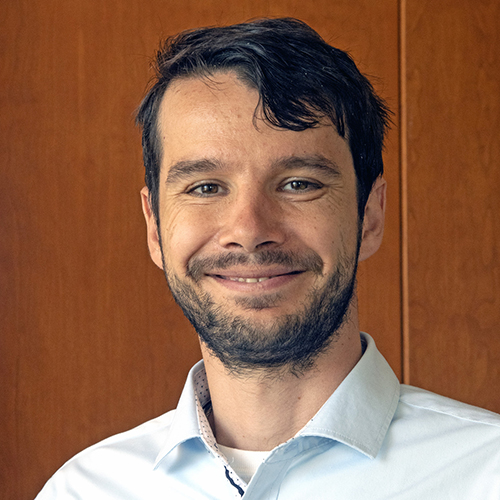
For patients with cancer, knowing in real time if a treatment is working—or if a cancer that was in remission has returned—can be the difference between life and death. Yet, at the moment, the only way to gather this information in detail is through CT or MRI scans, which are often expensive, difficult to schedule, and hard to access from rural areas.
To get around this problem, Ignaty Leshchiner is developing a simple blood test that can show cancer activity almost immediately. Many fast-growing tumors shed cells into the bloodstream, he says, and with simple DNA sequencing techniques, it is possible to flag elements of those cells’ mutated DNA, providing a rapid, low-cost diagnostic for a variety of cancers. Leshchiner, who recently joined the BU medical school faculty from the Broad Institute, is currently building a prototype version of the technology, and is using Ignition Award funding to further test the concept with clinical samples.
Teaching Reading with Smart Software
In 2022, the nation’s student performance report card—the National Assessment of Educational Progress—found a majority of American fourth and eighth graders were reading at or below a basic level. To help bridge that gap, Hank Fien is creating an AI-enhanced digital platform for teaching and assessing reading skills.
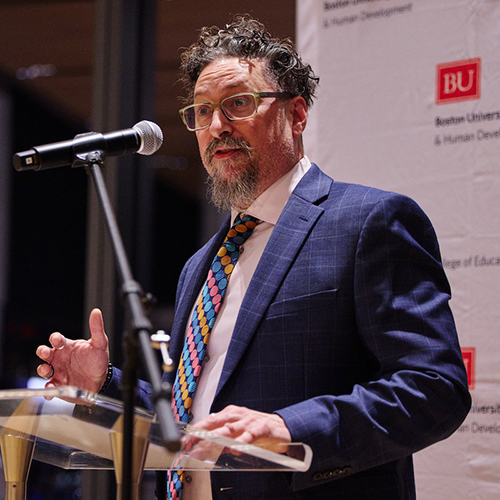
The new system, which builds on a paper-based reading intervention Fien, the Nancy H. Roberts Professor of Educational Innovation at BU Wheelock College of Education & Human Development, helped create in 2015, provides game-like lessons on a web interface or mobile device. As students play through these lessons, the AI-backed software immediately identifies the skills they need to improve, provides more lessons that reinforce those skills, and flags those areas for teachers so they can provide individualized attention. The system is not yet available for widespread use, but Fien—who is also director of the Wheelock Institute for the Science of Education—will use Ignition Award funding to continue developing a viable product while testing its efficacy in school classrooms throughout the Boston metro area.
Diagnosing Dementia with AI
Patients grappling with neurodegenerative conditions like Alzheimer’s disease and Parkinson’s disease often present comparable symptoms of memory loss and neurological dysfunction. However, distinguishing between these disorders is vital due to distinct underlying causes and management strategies. Detecting these differences early can significantly impact a patient’s prognosis.

To address this challenge, Vijaya Kolachalama has developed an innovative AI-powered solution. Leveraging medical data, imaging, and clinical tests, his software can pinpoint specific forms of dementia even before significant symptoms manifest. This enables healthcare professionals to tailor precise therapies and interventions. Kolachalama is an associate professor of medicine and computer science at the BU Faculty of Computing & Data Sciences and Chobanian & Avedisian School of Medicine.
With the support of Ignition Award funding, Kolachalama aims to validate the tool in clinical settings, ultimately presenting it to physicians and potential investors to enhance patient care and outcomes.
Comments & Discussion
Boston University moderates comments to facilitate an informed, substantive, civil conversation. Abusive, profane, self-promotional, misleading, incoherent or off-topic comments will be rejected. Moderators are staffed during regular business hours (EST) and can only accept comments written in English. Statistics or facts must include a citation or a link to the citation.